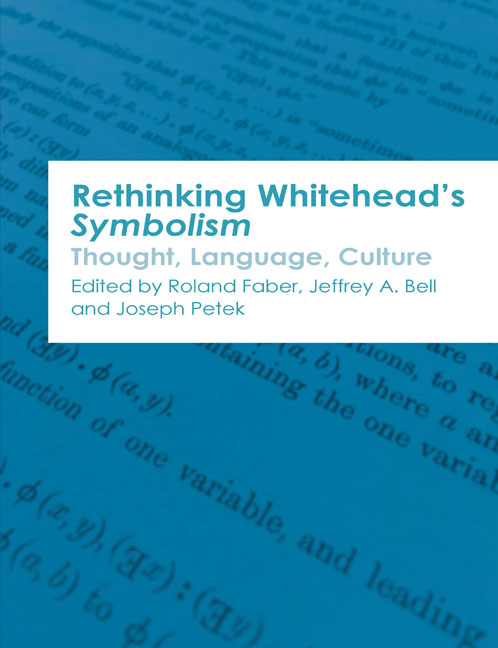Book contents
- Frontmatter
- Contents
- Abbreviations
- Introduction
- Part I Perception and Paradox
- Part II Adventures in Culture and Value
- Part III Misplaced Concreteness in Ethics and Science
- 8 A Dog's Life: Thought, Symbols and Concepts
- 9 From Manipulation to Co-creation: Whitehead on the Ethics of Symbol-Making
- 10 On Symbols, Propositions and Idiocies: Towards a Slow Technoscience
- 11 Of Symbolism: Climate Concreteness, Causal Efficacy and the Whiteheadian Cosmopolis
- Notes on Contributors
- Index
8 - A Dog's Life: Thought, Symbols and Concepts
from Part III - Misplaced Concreteness in Ethics and Science
Published online by Cambridge University Press: 23 June 2018
- Frontmatter
- Contents
- Abbreviations
- Introduction
- Part I Perception and Paradox
- Part II Adventures in Culture and Value
- Part III Misplaced Concreteness in Ethics and Science
- 8 A Dog's Life: Thought, Symbols and Concepts
- 9 From Manipulation to Co-creation: Whitehead on the Ethics of Symbol-Making
- 10 On Symbols, Propositions and Idiocies: Towards a Slow Technoscience
- 11 Of Symbolism: Climate Concreteness, Causal Efficacy and the Whiteheadian Cosmopolis
- Notes on Contributors
- Index
Summary
Do animals have thoughts? What would it mean to say that they do? To these questions, among others, philosophers have often answered that animals do not have thoughts, and if they did, it is assumed, they would speak a language. Aristotle, for example, argues in the Politics that whereas the bees are a gregarious, social animal, their lack of speech leaves them unprepared to ‘set forth the expedient and inexpedient, and therefore likewise the just and the unjust’, and hence it is our ability to think and state what is right and best that makes it possible to live together as ‘a family and a state’. Descartes is even more explicit in relegating thought only to those who speak a language – to wit, humans – for ‘Language is the only certain sign of thought hidden in a body’. Yet Descartes leaves the door open to the possibility that animals might think, for while language is the ‘only certain sign of thought’, he admits that we cannot be certain that they do not have thoughts – ‘the human mind does not reach into their hearts’. Philosophers in the twentieth century pushed their way through the door Descartes left ajar and began to explore the possibility of non-linguistic thought. Whitehead's extended essay, Symbolism: Its Meaning and Effect, was one of the first efforts to do just this.
In this chapter I will connect Whitehead's theory of symbols to recent work on animal thought, especially the work of Elisabeth Camp, in order to begin sketching a theory of the relationship between life and thought. In the case of Whitehead this relationship is particularly important, for a strong case can be made that Whitehead adopts a strong vitalist perspective (what we might call ‘panvitalism’) in his attribution of the fundamental, basic characteristics of life to all things. Evidence for this viewpoint is easily found in Whitehead's work. In his symbolism essay, for instance, Whitehead says the following: ‘A rock is nothing else than a society of molecules, indulging in every species of activity open to molecules’ (S 64), and ‘All physical response on the part of inorganic matter to its environment is thus properly to be termed instinct’ (S 78).
- Type
- Chapter
- Information
- Rethinking Whitehead’s SymbolismThought, Language, Culture, pp. 147 - 169Publisher: Edinburgh University PressPrint publication year: 2017



